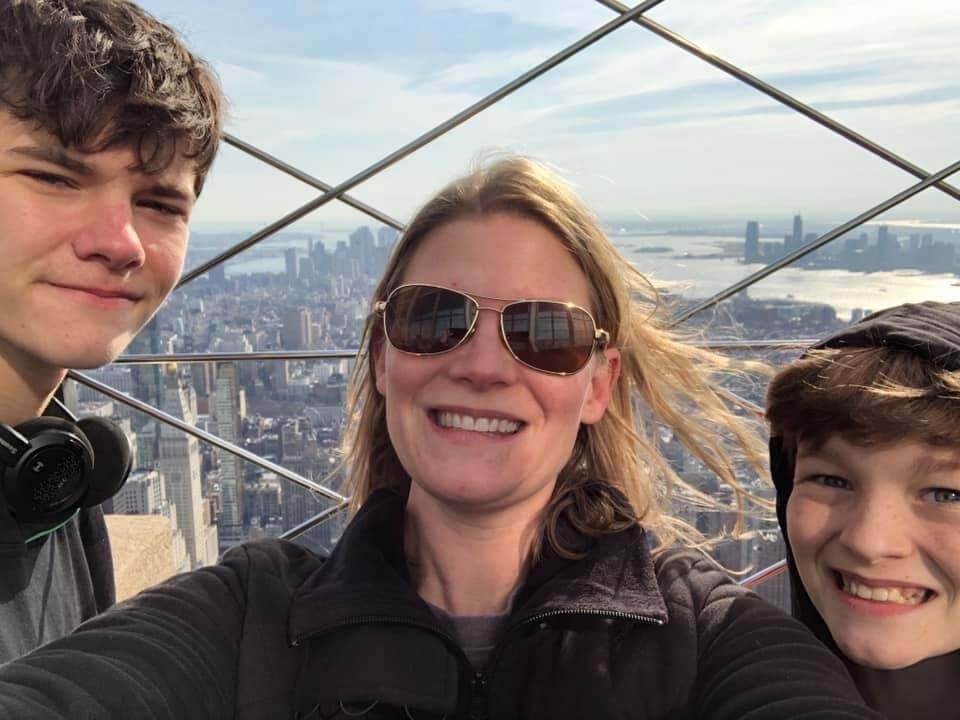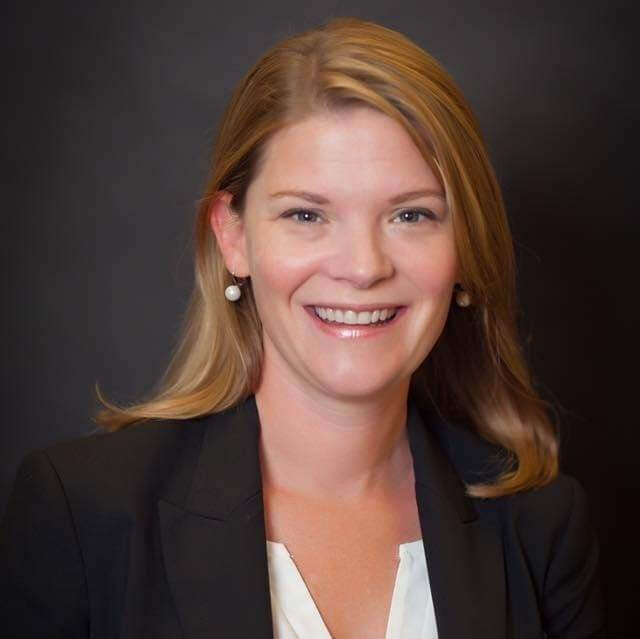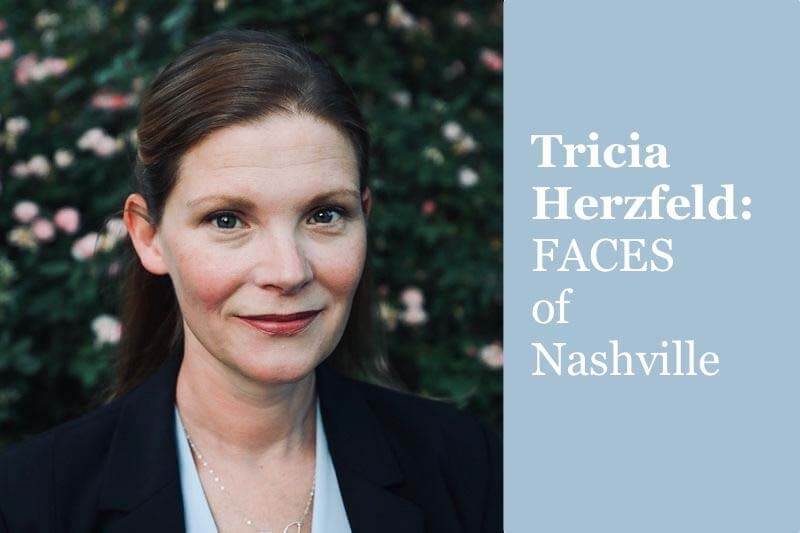Attorney Tricia Herzfeld is making waves in Nashville, successfully litigating civil rights cases on behalf of the marginalized. We need her now more than ever. The former Miami public defender and legal director of the American Civil Liberties Union of Tennessee is not only a frequent lecturer on civil liberties, she’s putting a lot of her efforts into protecting our voting rights through her position on the board of the Davidson County Election Commission. Meet Branstetter, Stranch and Jennings partner, and our newest FACE of Nashville, Tricia Herzfeld.

Tell us about your background.
I was born in a suburban town outside of Detroit. My dad worked in an auto factory, which is about the most Detroit thing you can possibly do! I actually ended up working on the line in a factory with my dad during the summer to pay for college. My mom worked as a pharmacy technician in a hospital, and neither of my parents went to college. I went to public school, which was very much like every afterschool special you’ve ever imagined — football games and the whole bit — and then, I went to college at George Washington University for undergrad. It was kind of on a whim, which is odd because most people at home kind of stayed in-state, and I had this pull to go to Washington. I was fortunate enough to get accepted at GW, which is where I met my husband. We had our daughter during my first year of law school.
What was the trajectory that brought you to your current practice?
When I left the ACLU, I worked with the late great Elliott Ozment. Elliott was the most amazing, bombastic lawyer who had a heart of gold. He cried easily, yelled loudly, and had the biggest and best laugh. He was the most generous, amazing, creative, supportive lawyer. He was just from a different generation — a different time. He was doing amazing civil rights work for immigrants; that was his thing. It was appealing to me because it allowed me to do bigger systemic change stuff and also the individual day-to-day stuff, which was great. My practice there was mostly doing criminal defense with immigrants because it’s really complicated, and also civil rights. I was involved in a lot of private prison litigation, a lot of law-enforcement raid stuff with ICE, that sort of thing.
I was with Elliot forever, and then I ended up switching over to my current law firm, which has amazing civil rights history. We were founded by a great civil rights lawyer, Cecil Branstetter, who represented all sorts of amazing folks. He worked with the Highlander Center, which is where everybody trained for the nonviolent protests during lunch counter sit-ins. I’m a partner, and I litigate against corporations and the government and doers of wrong. We are always on the side of the little guy. Right now, we’re suing the opioid industry folks. We’re trying to make the world a better place.
RELATED: Talking to Strangers is Her Superpower

What inspired you to become a civil rights attorney?
A lot of it is how I was raised. There were a variety of people who imparted on me the importance of looking out for other people. My mother made a huge point to raise my sister and me never to let someone be teased or excluded. We were taught never to allow those things to happen in our presence because it’s just not okay. You look out for the little guy — the underdog, whoever it may be. That was reinforced by my best friend growing up, whose parents had great, expansive ideas about the world and peace and different views of how to help people in ways that I hadn’t been exposed to. I also had this amazing high school English teacher who just opened my mind to the entire world of injustices that are out there. So, it was a combination of all of those.
How is the current climate affecting your work?
First and foremost, I have to talk about the election work because people are paying close attention to how elections are being done and the work that goes into putting on an election in a constitutional way without having five- and six-hour lines in a pandemic. The absentee voter issue has been politicized in a way that is not conducive to getting to the point of, How do you get the most people to vote? I understand people have concerns one way or the other, but it’s best to do things based on facts and data — not take a position just because it’s politically correct. That part has gotten complicated, but the Davidson County Election Commission is doing a great job of making sure that as many people can vote as possible.
Why are you so passionate about fighting for equal voting rights?
It shouldn’t be a fixed game, right? It should be whoever’s ideas resonate the most — whoever’s ideas are better … that’s the person who should win. That’s how it’s supposed to work. It shouldn’t be about Can I get more of my voters out and get your voters not to come? Or I’m going to play “gotcha” because you didn’t put exactly the right form in exactly the right spot. We should be expansive about allowing people to vote because nobody should be suppressing anybody’s right to vote. It’s actually kind of basic — if your ideas are right, you’ll win. So, we should all be encouraging as many people to vote as we can because then we get a better exchange of ideas. But it feels like things have devolved into I only want my voters to vote and I don’t want your voters to vote, or I’m going to make it incredibly difficult, so your voters have a harder time, or I’m going to be hyper-technical because I’m trying to stack the deck a little bit. I think we’ve gotten away from the point that we all have the right to vote.
RELATED: 1 Million Diapers Donated Over 8 Years: Meet These Local Heroes
What part can we play in changing the system?
Whenever I speak to groups, I try to make a point of letting people know different ways that they can engage. Saying “We need to get all voters under 25 out to the polls because their voting numbers are really low” feels really big. It makes you feel like, Oh my gosh, I’m not sure I can do that. I’m only one person. But when you tell people, “Your challenge is to register five people to vote between now and election day,” it’s more manageable. When you put it into bite-size projects like that, it’s a lot easier for people to engage.
The other thing is that a lot of folks think, It’s the presidential election, so my vote doesn’t really count; the state is going to go the way the state is going to go. I think they feel their individual vote doesn’t make a difference unless they live in Ohio. It discourages a lot of people from voting, quite frankly. But when you encourage people to take it a step further and say, “Did you know you can really affect change by voting for your school board members?” Young voters, especially, look at you like, What? The smaller your election, and the smaller the number of voters who vote, the more importance your one vote has. Just because someone is an elected official or candidate doesn’t mean they’re out there on some pedestal to never talk to you. You can pick up the phone and call any one of your school board members, and they will take your call. You can pick up the phone and call any one of your councilmembers, and I guarantee they will call you back. People forget the number of engagement opportunities that we have because we like to sit behind our phones and tweet about stuff we don’t like. But when you vote in local elections, your vote matters the most. Those council and school board people care a lot about what you, as their constituent, say and think. Your vote really matters to them. So, when you want to effectuate change, the best thing to do is vote locally.

What effect does the new vote by mail law have on civil liberties?
Right now, it’s a little bit complicated and in flux. The state legislature has not expanded vote by mail. As it is, by law and statute, anybody 60 and over can vote by mail automatically, with no excuse needed. Also, if you are ill, a caretaker for someone who is ill, or if you’re going to be out of the jurisdiction. There are a variety of boxes you can check to be able to vote by absentee. That is the law, and that is clear. The question that has come up for the November and August elections is, “Does the COVID pandemic qualify as someone being ill, in order to make them unable — or for it to not be advisable — to physically go to the polls?” A court ruled that the definition of “ill” does include — and should include — the COVID pandemic and anyone fearful of getting it by having to go out to the polls. Right now, all of the election commissions are accepting absentee ballot applications for folks who don’t want to go out in public to vote because of COVID. The Supreme Court declined to intervene, so all voters can vote absentee for the August primary election. We are still waiting to hear about the November election.

Can you speak to how the 19th Amendment has affected and continues to affect American history?
The right to vote underpins all of the rest of our constitutional rights. If you cannot select the leaders who govern, you do not have much of a voice in our democracy. The 19th Amendment was made possible by years of tireless labor by women who knew that in order to be able to change the things around them, they needed to be sure their voices were heard. Without their courage to challenge the laws depriving them of the most basic exercise of American civics, it’s terrifying to think about what the U.S. would look like for women today. Women’s right to vote was not the end goal, but the very beginning of a journey for full equality — a journey that continues today.
What is the best piece of advice you’ve ever been given?
Quit worrying about things that are out of my control.
Outside of faith, family and friends, what are three things you can’t live without?
Definitely tacos. Michigan is known for its lakes, and every year, I need to go back home and swim in a lake. It’s a must. Also, superhero movies. I love doing the movie thing with my family.
Thank you, Tricia, for sharing your story and inspiring us to get out and vote!
**********
Feel like being even more inspired? Check out our FACES archives HERE!



















